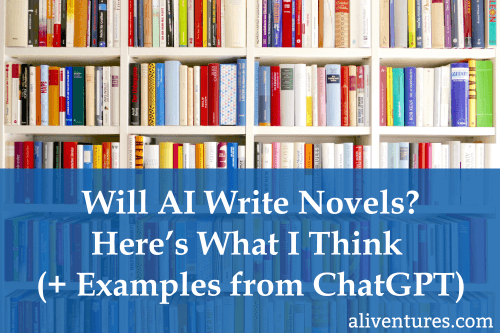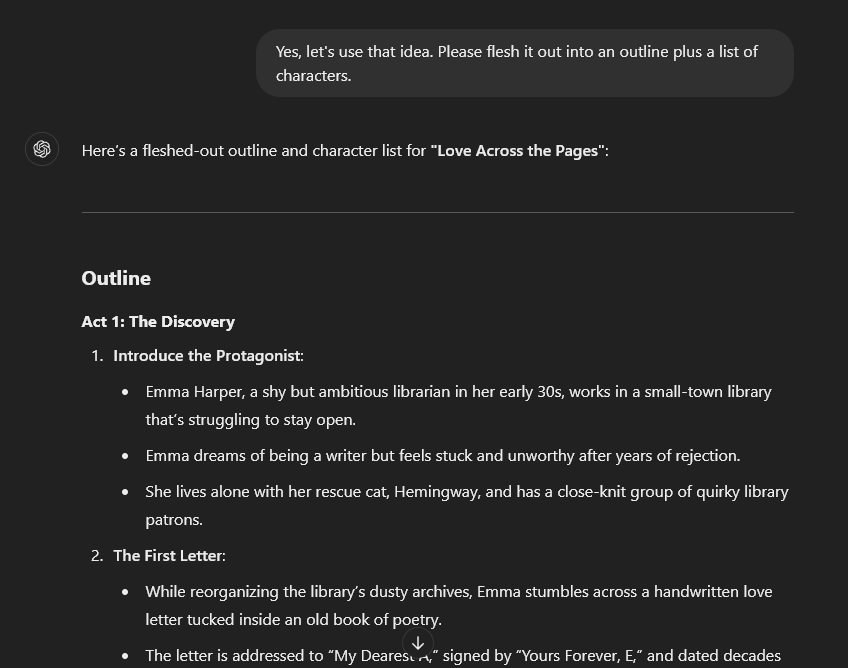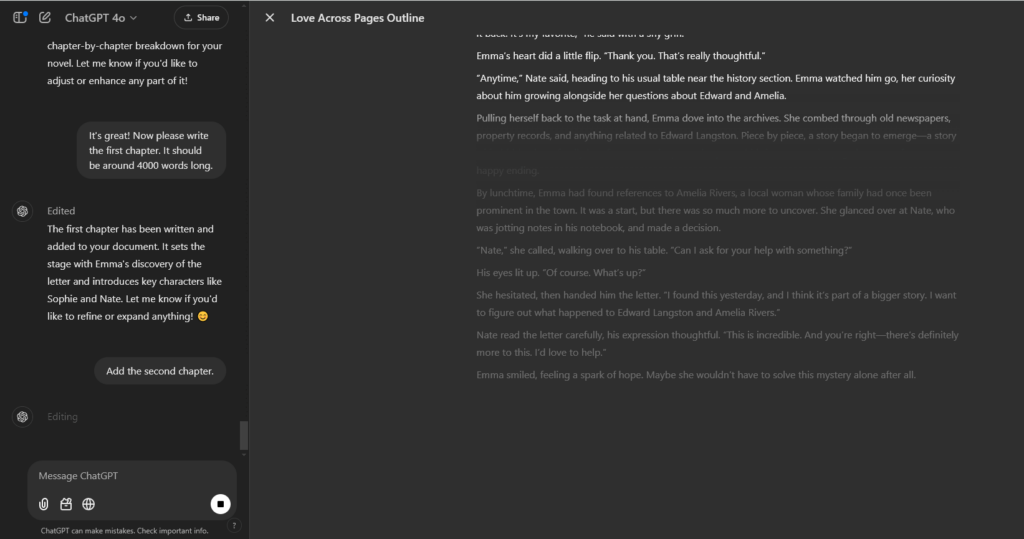Will AI Write Novels? Here’s What I Think (Plus Examples from ChatGPT)

One question that’s been on my mind often recently is whether AI will eventually be able to write novels.
As a novelist and a reader, this prospect definitely alarms me! As a freelancer, I’ve worked with several AI companies (and used AI tools to assist with my work, where clients want that), so I’m also curious about the boundaries of what AI can do.
Understandably, a lot of authors aren’t at all keen on AI (artifical intelligence). They don’t want their work to be used as part of a “dataset” for an AI—it feels tantamount to having it stolen.
AI also brings up environmental concerns, due to the processing power tools like ChatGPT use.
I won’t get into the various controversies here, because regardless, AI is here to stay, and it’s getting increasingly popular and powerful.
So will it write novels?
Here’s my take right now, in early 2025. AI has come a long way in just a couple of years, since ChatGPT was launched at the end of November 2022. It can’t do everything a human writer can do, but it can absolutely be a support to the creative process.
If you look a little further back, the massive improvement in AI is very clear. One of the first AI-written novels out there is Ross Goodwin’s 1 the Road, published in 2018. Here’s an extract from the first page:
A patch of green grass seemed to be seeking its face, but it was not much to see. A small patch of grass had already been stretched along the sidewalk, and the steps of the barn were locked.
Even within this paragraph, there’s a lot that doesn’t make sense. (The face of what? How is the grass stretched? Steps can’t be locked…)
Several years on, tools like ChatGPT can – as we’ll see in a moment – produce much more coherent fiction.
Note: There are a number of different AI language models out there, but I’ll be focusing on ChatGPT (from OpenAI) in this post, as it’s by far the most popular.
Let’s tackle the biggest question first.
Can AI Write a Full Novel?
Not yet! You can’t simply tell ChatGPT “write a novel” and produce a text that’s long enough to qualify for a novel.
You can absolutely use it to help you, though, perhaps with idea development and outlines.
Want to go further? If you’re really keen to get AI to produce something approaching a full novel, you can prompt it step by step through the writing process.
Here’s what I did to test it out, along with the prompts I used. I deliberately kept the prompts very simple and bare-bones: more detailed prompting would get better results, but I wanted to see what ChatGPT would do with minimal guidance.
Step 1: Ask ChatGPT for a List of Ideas in a Specific Genre
Prompt: “Give me 10 ideas for a romance novel.”
ChatGPT obliged. I wasn’t that keen on any of its ideas, so instead of picking one, I asked it which idea it liked best out of those 10. It chose its third idea, “Love Across the Pages. A lonely librarian discovers love letters tucked inside old books, leading her to an enigmatic author who might be writing them just for her.”
I can see the potential appeal in this idea: books about bookshops and libraries always seem to go down well with readers!
Step 2: Get ChatGPT to Create an Outline
Prompt: “Yes, let’s use that idea. Please flesh it out into an outline plus a list of characters.”
ChatGPT gave me an outline, split into 3 acts, plus a list of characters with first names, surnames, and brief descriptions. (This alone would save me a fair amount of thinking time – I’m bad at naming characters.)

Step 3. Have ChatGPT Write a Chapter-by-Chapter Outline
Prompt: “I like the outline. Flesh it out into a chapter-by-chapter outline.”
ChatGPT got fairly close to what I asked for, but it only included 10 chapters, which seemed a bit short on material for a novel. The chapter-by-chapter outline wasn’t all that much more detailed than the initial outline it gave me.
Step 4. Use ChatGPT to Generate the First Chapter
Prompt: Now please write the first chapter. It should be around 4000 words long.
ChatGPT is not good at wordcounts. This seems like a really easy thing it should be able to do … but apparently it’s harder than it looks for an AI to count words!
It did give me Chapter 1, but it was only 1,296 words long. You can read it here. That’s exactly as ChatGPT gave it to me: I haven’t edited anything.
Here’s an excerpt from the first page:
“Miss Harper?” a small voice piped up, breaking Emma’s thoughts. She turned to find Daisy, a seven-year-old with a permanent streak of dirt on her cheek, clutching a picture book about whales.
“Yes, Daisy?” Emma asked, crouching to the girl’s level.
“Can I check this out? It’s for my project at school.” Daisy held out the book like it was a treasure, her wide eyes brimming with enthusiasm.
“Of course you can. Let’s go get it scanned.” Emma led her to the front desk, where she carefully stamped the book with the due date. Daisy grinned and skipped out the door, her mother trailing behind her with a quick wave of thanks.
Moments like that reminded Emma why she fought so hard for the library. It wasn’t just about books; it was about people, connections, and the way stories shaped lives. But reminders didn’t pay the bills.
Honestly, this isn’t terrible. I’d even say it’s competent. The dialogue makes sense and while the situation seems a bit cliched and the sentiments a bit forced, I’ve definitely written worse first draft material myself.
Step 5. Ask ChatGPT to Continue Generating Chapters
I asked ChatGPT to write the second chapter, and it obliged. Interestingly, it seemed to “read” through the first chapter before doing so, which took it a minute or so. Here’s a screenshot of it in action, doing this:

You could go on like this, chapter by chapter, prompting the AI to make changes if you wanted to.
Here are a few things I noted about the process:
- ChatGPT tends to come up with outlines that are rather light on tension and plot. They might sustain a short novella, but you’ll likely need to do a fair amount of prompting (or editing of an outline) if you want enough material for a novel.
- ChatGPT’s style is pretty bland: not just the writing itself, but it feels like not a lot is really happening in the story. I found it focused a lot on two characters (Emma and Nate) without bringing in other characters or complications. Mostly, they just sat in the library talking as they pored over old letters.
- While the writing is grammatical, it’s not particularly interesting to read! I think this is where the human element is really needed—but ChatGPT could be helpful in providing a first stab at a scene or alternative ideas for a chapter, if you’re struggling.
I do think ChatGPT would be capable of more if I spent a lot of time crafting detailed prompts and getting it to write in different styles … and I may well play around with that and blog about it again in future.
Will AI Write Novels in the Future?
AI technology has come on fast in slightly over two years. A lot of the early issues that ChatGPT had are no longer problems: it can write in a much less robotic style, it doesn’t tend to “hallucinate” information to the same extent, it has access to the web, and so on.
I suspect we’ll increasingly see “hybrid” works of fiction, created with heavy use of generative AI. For instance, authors might train AI to write in their style, and then use the AI to help draft their latest book. (Perhaps that would speed George R.R. Martin up!)
A big issue with AI is that it can’t truly create in the way that humans can. It can only draw on and mush together pre-existing elements from its dataset. This means it can create texts that feel a bit like a pastiche of existing texts, but it won’t come up with something truly innovative.
That doesn’t necessarily mean it won’t ever be able to write novels with minimal assistance, though. In some commercial genres, readers always want more of the same. I’m sure AI can come up with plenty of “enemies to lovers” or “only one bed” plots (staples of the romance genre). It may be that an advanced enough AI, with very solid prompts and examples, could write a coherent 70,000+ word novel with only a bit of input from a human.
What AI probably won’t do any time soon is write literary novels. Though Monica Ali, writing in The Guardian, fears it may one day be advanced enough to do so:
Perhaps literary fiction – the genre I write in – will be a harder nut for the AI machine to crack. It’s less formulaic. It relies more on depth of characterisation and elegant and innovative use of language. But remember that these AIs are babies, still sucking on dummies. By the time they reach maturity, adolescence even, they may reach a level of sophistication that is difficult to imagine today.
Do you think AI is going to write novels? What about other types of fiction? I suspect AI might get used for fanfiction, for instance, as fanfic writers already play with canon, create alternative universes for the stories, and so on … all things AI could be great at.
I’d love to hear your thoughts in the comments below.
About

I’m Ali Luke, and I live in Leeds in the UK with my husband and two children.
Aliventures is where I help you master the art, craft and business of writing.
Start Here
If you're new, welcome! These posts are good ones to start with:
Can You Call Yourself a “Writer” if You’re Not Currently Writing?
The Three Stages of Editing (and Nine Handy Do-it-Yourself Tips)
My Novels

My contemporary fantasy trilogy is available from Amazon. The books follow on from one another, so read Lycopolis first.
You can buy them all from Amazon, or read them FREE in Kindle Unlimited.


Honestly, who’s to say. Maybe one day people will be looking for human written books the way we look for organic food these days. It’s kinda terrifying.
Find this kind of stuff goes into transhumanism, which by itself is an interesting topic you may enjoy poring over
Thanks! I’ve read a bit about transhumanism (I find it sort of terrifyingly fascinating as a mindset). It’s definitely been eye-opening watching how fast AI has progressed over the past few years.
This is an interesting question. I do think somewhere down the road, AI will write books. Maybe even decent ones. I even see a monthly subscription service where you can build your own book by answering some questions and even name the characters. Actually, that sounds kind of fun. But I don’t think it will replace authors or books written with creativity and hard work. People may choose to read AI generated books but I don’t think it will exclude the others. For now, I’m learning all about it and playing around with it. It’s a tool that’s here to stay and I prefer to stay up to speed with it rather than falling behind.
That’s a cool idea, using AI for a personalised book! I think you’re right that there could well be a market for that.
Playing around and staying up to speed with AI as it develops sounds like a really smart move.
rs. For now, I’m learning all about it and playing around with it.
That’s a good way to approach AI, I think!
Honestly, I’m sure AI will be capable someday of generating “novel-length, coherent texts” that might satisfy the type of readers that just want to read more of the same…but as a different sort of reader myself, I never saw the point of reading just to hear the exact same ideas or themes under a new coat of paint, or for a moment’s entertainment alone. I think the human element, even in non “literary” fiction, involves having a conversation between different minds, that continues throughout the history of civilization, and AI is simply incapable of furthering that conversation when it lacks the ability to have thoughts, experience, or emotions of its own.
As a writer, even though it could be useful as a tool…I also love the process of brainstorming and creating, and the struggles are what make the breakthroughs feel so meaningful. Conceiving and finishing a novel felt like a story in itself with highs and lows, and for all the toil, I value that part too much to hand it off just so I can have some version of the end product faster.
The sad part to me is while AI cannot (and I don’t think is meant) to replace the human element in stories, it will be abused, and make the novels worth reading even harder to find in the sea of content.
That’s a very good point about the ongoing conversation nature of stories: it reminds me of T.S. Eliot’s “Tradition and the Individual Talent”, where he talks about how we write not in a vacuum but informed by all the writers that have gone before us, in a sense.
You’re right that AI can’t continue a conversation (at least not at present). Instead, it gives a sort of mash-up of everything that’s gone before, which it’s been provided with in its training data.
I agree that writers won’t want to stop writing novels, either … I certainly wouldn’t!
The sad part to me is while AI cannot (and I don’t think is meant) to replace the human element in stories, it will be abused, and make the novels worth reading even harder to find in the sea of content.
Hi!
I love the article.
I agree with you about AI. We are in the beginning. More soon than later, I think we will see more great program abilities.
I created a short novel using AI as an experiment. The hard part was making the prompts. But the results were excellent. AI gave a frame for the basics of writing.
Thanks for sharing your thoughts!
Thanks Enriquillo! I do think a lot is possible using excellent prompts. It’ll be interesting to see how things develop over the next few years, as you say.